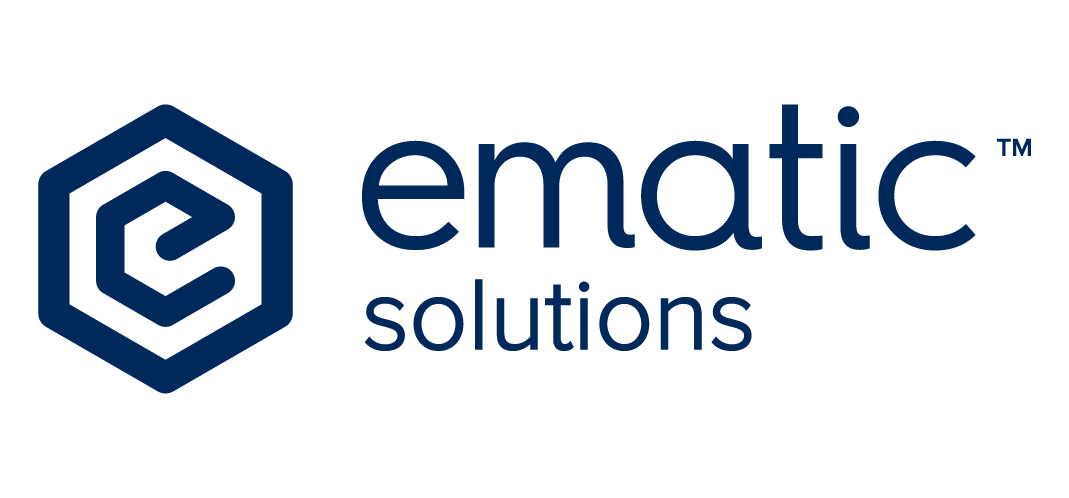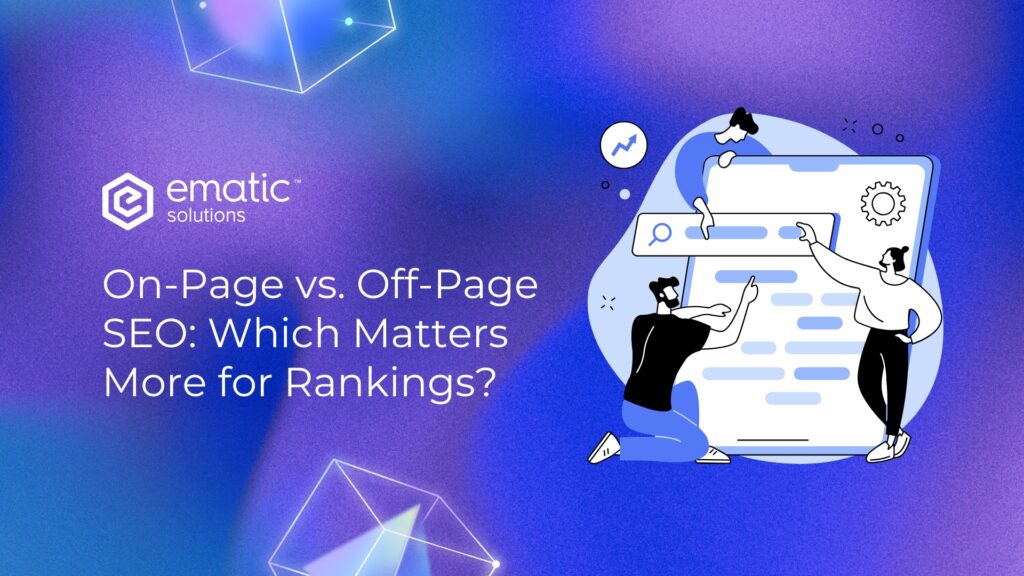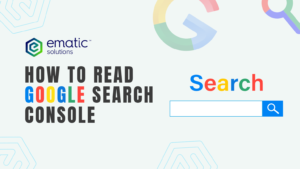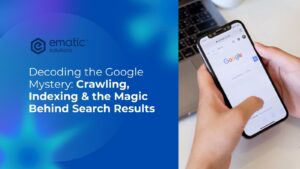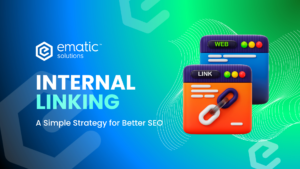If you’re trying to improve your website’s search rankings, you’ve probably heard about on-page SEO and off-page SEO. But which one actually makes the biggest impact? Should you focus more on optimizing your website’s content and structure, or is building backlinks and external reputation the real key to ranking higher?
The truth is, both on-page and off-page SEO play crucial roles in helping your site rank well in search engines like Google. However, understanding how they work, their differences, and which one to prioritize can make a big difference in your SEO strategy.
In this article, we’ll break down:
✅ What on-page and off-page SEO are
✅ Key differences between the two
✅ How each impacts your rankings
✅ Which one should be your primary focus
By the end, you’ll have a clear understanding of how to balance both strategies for maximum search engine visibility and long-term success.
What is On-Page SEO?
On-page SEO refers to the optimizations you make directly on your website to improve its visibility in search results. This includes refining your content, using proper keywords, optimizing meta tags, and improving internal linking. It’s all about making your website relevant and user-friendly for both search engines and visitors.
Key Components of Off-Page SEO
High-Quality Content
High-quality content is the foundation of effective on-page SEO. It should be valuable, informative, and engaging to keep visitors interested and encourage them to stay on your site longer. Content that directly addresses user intent—what people are searching for—improves the chances of retaining visitors and reducing bounce rates. Additionally, using keywords naturally and strategically within the content helps search engines understand the topic, making it more likely to rank well in search results.
Title Tags & Meta Descriptions
Title tags and meta descriptions play a crucial role in how both search engines and users perceive your content. A well-optimized title tag pr meta title should include relevant keywords and be compelling enough to encourage users to click.
Meanwhile, the meta description, though not a direct ranking factor, influences click-through rates (CTR) by summarizing the content in a way that entices users to visit your page. Together, these elements help improve visibility in search results and attract more visitors.

Internal Linking
Internal linking helps search engines understand the structure of your website by connecting related pages and establishing content hierarchy. This not only improves crawlability but also ensures that ranking power is distributed across different pages, boosting the visibility of less prominent content. For users, internal links enhance navigation by guiding them to relevant pages, increasing engagement and time spent on the site.
URL Structure & Image Optimization
A well-structured URL provides clarity for both search engines and users. URLs that are short, descriptive, and contain relevant keywords tend to rank better and improve user experience.
Similarly, optimizing images is essential for both performance and accessibility. Search engines rely on alt text to understand image content, which helps with rankings while also making the site more accessible to visually impaired users. Proper image compression and formatting also contribute to faster page loading speeds, enhancing overall user experience.
Mobile-Friendliness & Readability
With most internet traffic coming from mobile devices, ensuring that your website is mobile-friendly is no longer optional—it’s essential. A website that doesn’t display properly on smaller screens or takes too long to load will frustrate users and increase bounce rates, signaling to search engines that your content isn’t providing a good experience. Similarly, readability plays a huge role in keeping visitors engaged. No one wants to struggle through walls of text, tiny fonts, or poor contrast. If your content is hard to read, visitors will leave quickly—hurting both engagement and rankings.
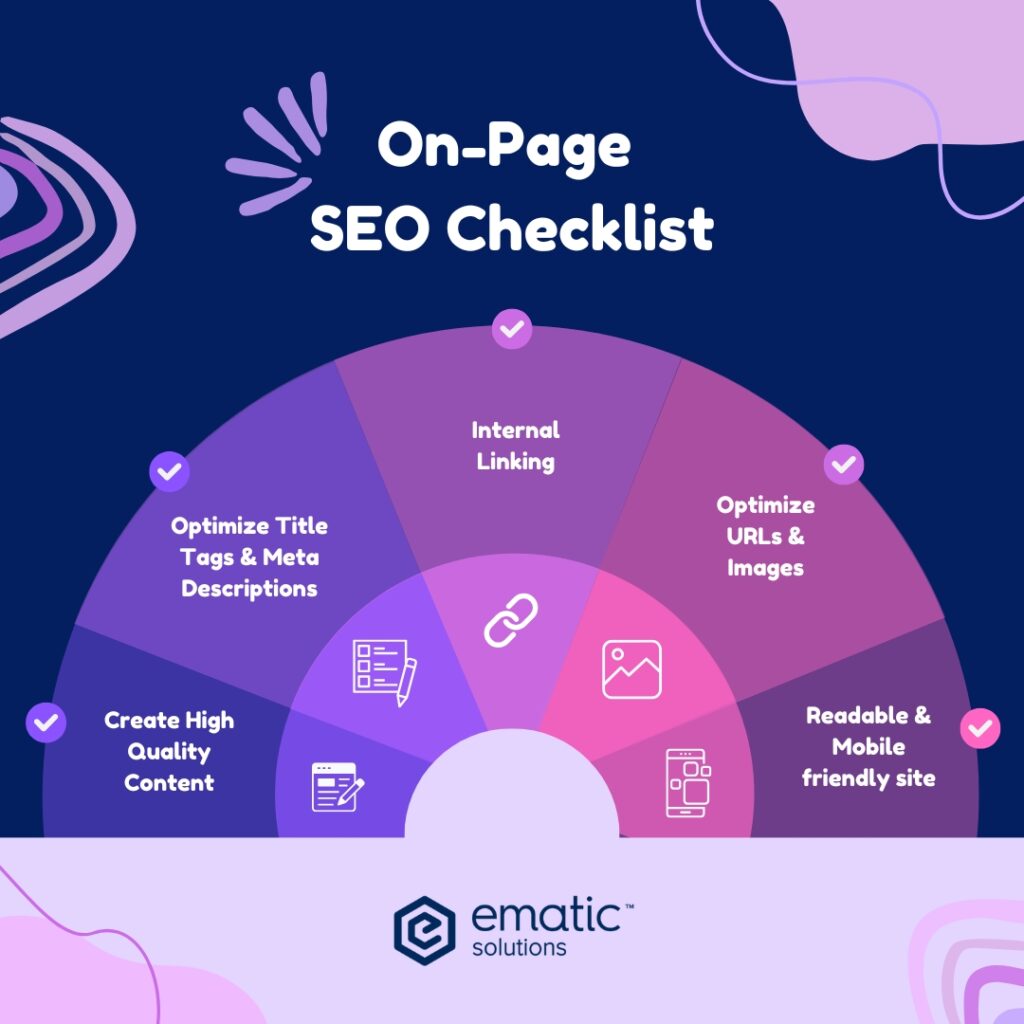
What is Off-Page SEO?
Off-page SEO refers to external factors that influence your website’s authority and credibility. The main focus is link-building—getting other reputable websites to link back to yours—but it also includes social signals, brand mentions, digital PR, and local SEO efforts like optimizing your Google Business Profile (GBP)
Key Components of Off-Page SEO
Backlinks (Link Building)
Backlinks are among the most important factors in off-page SEO. When authoritative websites link to your content, it signals trust and credibility to search engines. However, quality is more important than quantity—a few links from high-authority, relevant websites carry more weight than numerous low-quality backlinks. Poor-quality links from spammy sites can actually harm your SEO, so link-building should focus on securing natural, relevant, and valuable links. For deeper insights into the importance of backlinks, explore how backlinks can boost your organic traffic.
Brand Mentions & Citations
Even if they don’t include direct backlinks, brand mentions across the web can contribute to SEO success. When reputable sites or publications mention your brand, search engines take note of this authority. Similarly, local business citations—such as listings in directories like Google My Business, Yelp, or industry-specific platforms—help establish credibility and improve local SEO rankings.
Guest Blogging & Digital PR
Writing guest posts for well-established blogs or news outlets allows you to showcase your expertise while earning backlinks to your site. Digital PR efforts, such as press releases, interviews, and feature stories, also contribute to building brand authority. These strategies not only enhance your search rankings but also position your brand as an industry leader.
Update Google Business Profile (GBP)
When it comes to local SEO, Google Business Profile (formerly Google My Business) is one of the most powerful tools you can use to improve your online presence. Having a well-optimized GBP listing helps businesses appear in local search results, Google Maps, and the “Local Pack” when users search for services near them. This is especially important for brick-and-mortar businesses and service providers who rely on local customers. A complete and active profile increases credibility and encourages potential customers to choose your business over competitors.
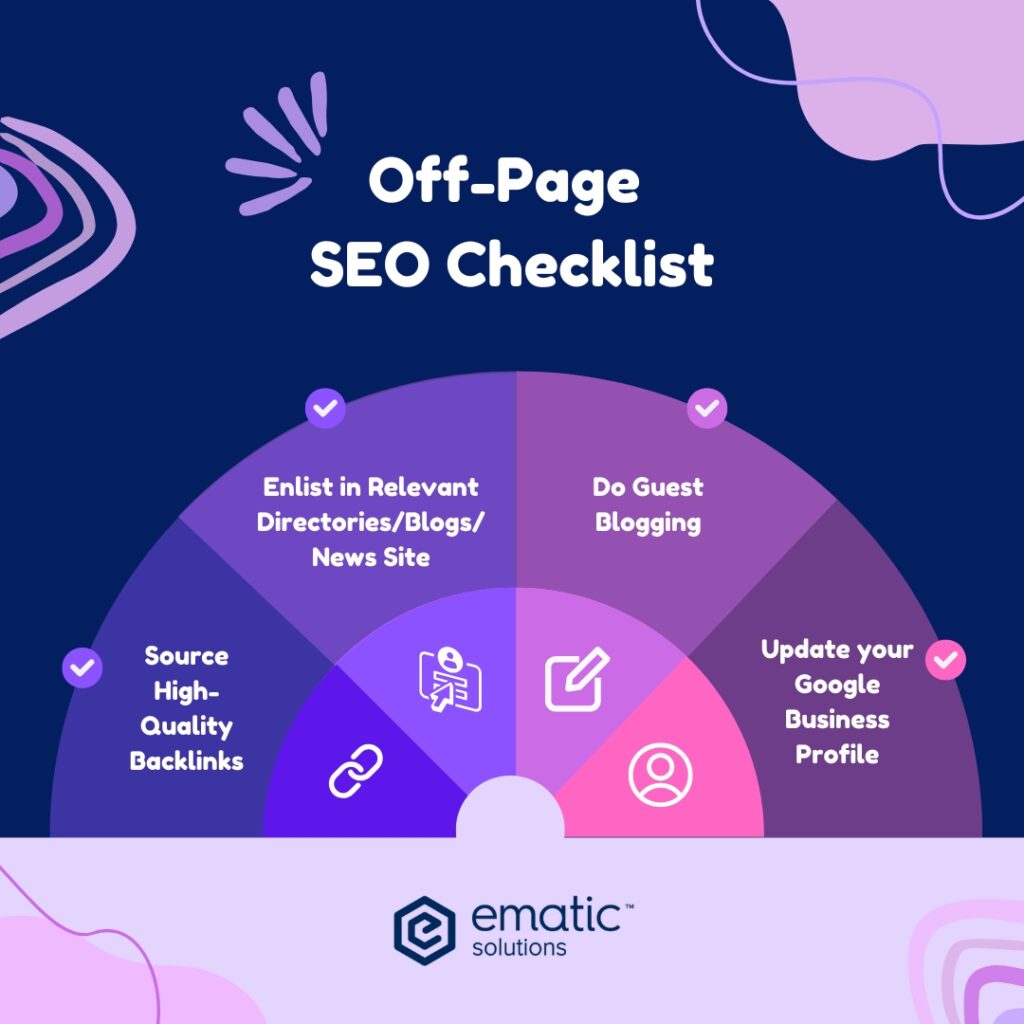
Key Differences Between On-Page and Off-Page SEO
| Aspect | On-Page SEO | Off-Page SEO |
| Definition | Optimization done within your website. | External efforts to boost credibility. |
| Control | Fully within your control. | Relies on other websites and external platforms. |
| Goal | Improve content relevance and user experience. | Build website trust and authority. |
| Impact | Helps search engines understand and rank your content. | Increases domain reputation and competitiveness. |
| Examples | Keyword placement, meta tags, internal linking. | Link building, social engagement, guest blogging. |
Which Matters More for Rankings?
On-Page SEO Should Come First
If your on-page SEO is weak, off-page efforts won’t be as effective. Search engines need to understand your content before they can rank it highly.
Off-Page SEO Strengthens Rankings
Once your on-page SEO is solid, off-page SEO can help push rankings higher by building domain authority. If two websites have equally well-optimized content, the one with better off-page signals (backlinks, mentions) will rank higher.
The Best SEO Strategy: Balance Both—But Don’t Overlook Technical SEO
A well-rounded SEO strategy requires a balance between on-page and off-page SEO to achieve sustainable rankings. On-page SEO ensures your content is relevant and well-optimized, while off-page SEO builds authority and credibility through backlinks and brand mentions. However, focusing only on these two aspects isn’t enough—technical SEO is just as important.
Technical SEO ensures that your website is structured correctly for search engines to crawl and index efficiently. Factors like site speed, mobile-friendliness, structured data, and secure connections (HTTPS) contribute to overall search performance. Without proper technical optimization, even the best on-page content and strongest off-page efforts may not yield the best results.
For long-term SEO success, the ideal approach is to:
✔ Start with strong on-page SEO – Ensure your content is optimized, user-friendly, and relevant.
✔ Build off-page authority – Focus on high-quality backlinks, brand mentions, and engagement.
✔ Optimize technical SEO – Maintain a fast, mobile-friendly, and well-structured website.
By integrating all three elements—on-page, off-page, and technical SEO—you can maximize your website’s visibility, improve search rankings, and create a seamless experience for both users and search engines.
Curious About SEO? Contact Us Now for a Free Website Audit!
